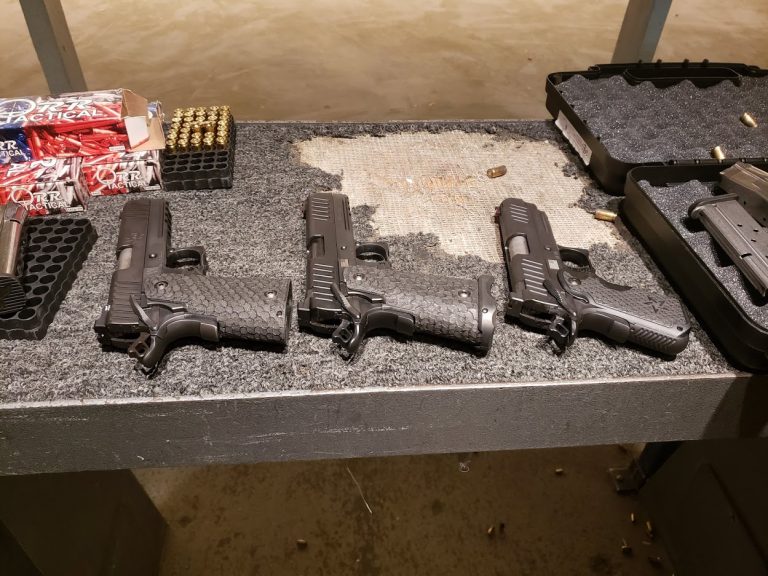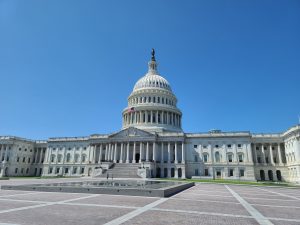Gun group spending ahead of the Georgia Senate runoff has been decidedly one-sided.
With the election only days away, none of the three major national gun-control groups–Everytown for Gun Safety, Giffords, and Brady–are making much of an effort to influence the race’s outcome, Federal Election Commission (FEC) records show. The latest filings for Everytown for Gun Safety’s Super PAC show it has spent the most to back incumbent Senator Raphael Warnock (D.), with about $54,100 in support. Neither Brady PAC nor Giffords PAC has submitted updated filings since the November general election. None of the gun-control groups’ websites refer to any new spending or advertising campaigns ahead of the final Senate race.
The lack of activity among the major gun control groups stands in stark contrast to the strategy taken by gun-rights advocates ahead of election day. The National Rifle Association Political Victory Fund has poured more than $3 million into the race on television ads, digital ads, media placement, mailers, and text messages in support of Herschel Walker (R.), the PAC’s filings show.
Everytown did not respond to a request for comment, but an FEC filing made public on Friday showed the group made its biggest buy of the cycle. The Center for Responsive Politics said the gun-control group is still likely to be significantly outspent in the race by the NRA even if they make several more five-figure buys before election day.
“Everytown’s overall spending on the Georgia Senate race is still dwarfed by the NRA’s overall spending on the race, but the disparity is especially dramatic just looking at spending during the runoff,” Anna Massoglia, editorial manager for the group’s publication Open Secrets, told The Reload. “Everytown had spent about $1 million on the race prior to the runoff, then pulled back while the NRA continued to ramp up its spending. The NRA’s PAC spent $1,622,343 prior to election day then stopped reporting spending, while the super PAC spent just $693,059 prior to election day. The bulk of the super PAC’s spending, over $3.1 million, came after election day.”
Timothy Lytton, a Georgia State University law professor who studies gun politics, told The Reload that the gap in reported spending could be the result of differing strategies.
“I think gun-rights groups are probably doing more to craft a media strategy,” he said. “That takes a lot more dollars. The gun-control groups are probably trying to mobilize more volunteer networks in terms of getting turnout.”
The runoff battle is the last key Senate race in which the NRA and all three major gun-control groups have endorsed a candidate–the NRA for Walker and the other three for Warnock. The race’s outcome will determine the extent of Democratic control in the Senate. If Walker wins, the Senate will remain a 50-50 split, and Vice President Kamala Harris (D.) will again be the tie-breaking vote for the Democrats’ razor-thin majority. If Warnock wins, Democrats will have gained a seat in the chamber in an unusually strong midterm performance for a party with an incumbent President in the White House. It will also lock in a key Georgia Senate seat under Democrat control for another six years.
Few polls have been conducted for the race, but those that have been released show a narrow lead for Senator Warnock. An AARP/Fabrizio Ward & Impact Research poll released last Tuesday found Warnock leading Herschel Walker 51 percent to 47 percent among all likely voters. That’s a gap within the poll’s margin of error, meaning voter turnout could be a decisive factor.
At the same, investments from gun groups may not be enough to sway the outcome of the race. The same poll found that among voters aged 50 and older, the demographic most likely to vote in the race, only four percent rated gun control/gun rights as their most important deciding issue. That puts it ahead of only climate change as the least cited issue among eleven possible choices. Just two percent of older voters who are not already committed to either candidate rated guns as their top issue.
Lytton agreed that guns have faded a bit as an important issue among the Georgia electorate. He chalked that up to the recent success of the gun-rights movement in getting measures like permitless carry passed in the state, diminishing the sense of urgency for pro-gun voters.
“Gun rights have been near the top of the state’s political agenda for well over a decade, and there have been a lot of legislative successes for gun-rights groups,” he said. “I think in some ways that has taken the wind out of their sails. One of the things that prompts turnout among gun-rights voters is the fear that their liberties are going to be restricted.”
With Republicans now in control of the House, and an extremely narrow Democratic majority a foregone conclusion in the Senate, the race’s outcome will likely have little bearing on the prospects of new gun legislation clearing Congress. However, an additional Democratic seat in the Senate would help tip the balance of power among committee members and boost President Biden’s ability to make key political and judicial appointments that could significantly affect gun policy.
The NRA, Giffords, and Brady did not respond to a request for comment.
The election will take place on December 6.
UPDATE 12-2-2022 2:13 PM EASTERN: This piece has been updated with the latest Everytown FEC filing and comment from Anna Massoglia.






